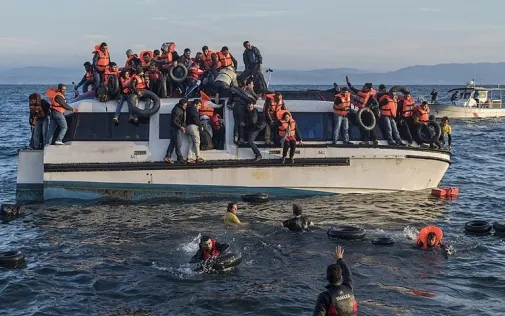
How are we not outraged regarding the treatment that refugees receive in Lesbos by the police and xenophobic groups? How can we accept this obvious proclamation of a permanent state of emergency against people seeking asylum?
What are Turkey and Greece doing against refugees with the consent of the member states of the European Union? Can we not be outraged regarding the treatment that refugees receive in Lesbos by the police and xenophobic groups? How can we accept this obvious proclamation of a permanent state of emergency against people seeking asylum? How are this horror and cruelty even possible?
There are many questions we can ask ourselves, but there is one that, especially at this time, is essential and can allow us to put an end to these atrocities once and for all depending on the answer: through what legal and political procedures have we allowed refugees to be deprived of many of their rights and freedoms without this being a constitutional crime?
We already know the classic government response: given that we are faced with an issue of national sovereignty, rights can be suspended since the situation so requires. But this answer is not true. It is about time that we report this hypocrisy and double discursive handling revolving around the conditions of refugees.
The first manipulation is to defend an absolute conception of sovereignty and not to recognize that it has been progressively eroded. Today, state sovereignty is limited, among other reasons, by the need to respect the interests and legitimate expectations of refugees and by the respect for their fundamental rights. This response allows us to disarm and denounce all the policies and practices of social apartheid against people suffering from persecution, such as those in Greece. It also allows us to invalidate the behaviour of states that, with the consent of the European Union, act as protective actors of their own and as predators towards those whom they consider as enemies (people who have to flee their countries).
The second state manipulation focuses on the effectiveness of the human rights of refugees and the Greek decision to suspend the right to seek asylum for a month, which is recognised by the 1951 Geneva Convention and the 1967 Protocol relating to the Status of Refugees. Contrary to general International Law and to that laid down in Article 78 of the Treaty on the Functioning of the European Union (TFEU), this decision is based on the simplistic statement that refugees have fundamental rights just for being refugees. This is not true. We have to raise our voices and condemn the falseness and peril of this statement: refugees have rights just because they are people and they have additional protection – on issues such as origin, traffic and destination - due to their current vulnerable situation. Thus, to suspend the human rights of refugees - and, specifically, the international treaties that offer this additional protection – is a blatant violation of the International Human Rights Law. To these obvious violations which are argued for safety and order and control of migration reasons, we can also add the attempt to criminalise sympathy for refugees and the toxic narratives spread by governments and xenophobic groups contraries to the human right of asylum.
By condemning these manipulations, we also condemn the opportunist alteration of the right of asylum – a right, not a privilege – that portrays the refugee as a stranger and a threat, justifying the change in rhetoric: protection is no longer towards it but against it.
In a nutshell, this is what is happening in Greece, this is what the European Union and its member states are allowing to happen, this is a dehumanization of people who are in a situation of extreme vulnerability, and whether by action or omission, this is what should be criminally prosecuted and entail social responsibility.
This way of exercising power and causing submission, of denying the right of a decent life, we must not waver against discursive manipulations and we must defend our arguments and the rights of refugees.



Add new comment